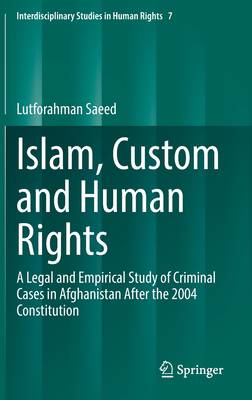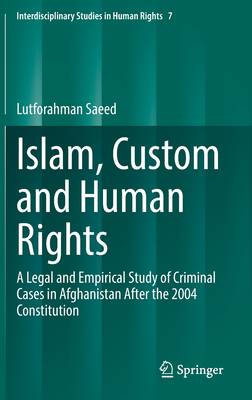
- Afhalen na 1 uur in een winkel met voorraad
- Gratis thuislevering in België vanaf € 30
- Ruim aanbod met 7 miljoen producten
- Afhalen na 1 uur in een winkel met voorraad
- Gratis thuislevering in België vanaf € 30
- Ruim aanbod met 7 miljoen producten
Zoeken
Islam, Custom and Human Rights
A Legal and Empirical Study of Criminal Cases in Afghanistan After the 2004 Constitution
Lutforahman Saeed
€ 126,95
+ 253 punten
Uitvoering
Omschrijving
For the first time, the author has explored the intertwinement of written law, Islamic law, and customary law in the highly complex Afghan society, being deeply influenced by traditional cultural and religious convictions. Given these facts, the author explores how to bridge the exigencies of a human rights-driven penal law and conflicting social norms and understandings by using the rich tradition of Islamic law and its possible openness for contemporary rule of law standards. This work is based on ample field research in connection with a thorough analysis of the normative contexts. It is a landmark, since it offers broadly acceptable and thus feasible solutions for the Afghan legal practice. The book is of equal interest for scientists and practitioners interested in legal, religious, social, and political developments concerning human rights and regional traditions in the MENA region, in Afghanistan in particular.
Specificaties
Betrokkenen
- Auteur(s):
- Uitgeverij:
Inhoud
- Aantal bladzijden:
- 211
- Taal:
- Engels
- Reeks:
- Reeksnummer:
- nr. 7
Eigenschappen
- Productcode (EAN):
- 9783030830854
- Verschijningsdatum:
- 30/10/2021
- Uitvoering:
- Hardcover
- Formaat:
- Genaaid
- Afmetingen:
- 156 mm x 234 mm
- Gewicht:
- 503 g

Alleen bij Standaard Boekhandel
+ 253 punten op je klantenkaart van Standaard Boekhandel
Beoordelingen
We publiceren alleen reviews die voldoen aan de voorwaarden voor reviews. Bekijk onze voorwaarden voor reviews.











